Statement of Purpose
Gandhi is often referred to as a political philosopher but is rarely mentioned as an economic theorist. A few writers, however, have discussed the economic implications of Gandhian nonviolence, E. F. Schumacher being among the most prominent, in Small is Beautiful, and A Guide for the Perplexed. The anthology edited by R. Diwan and M. Lutz, Essays on Gandhian Economics is also a useful handbook. The post-Gandhian Indian nonviolent movements of Gramdan and Bhoodan, sometimes linked under the common theme of Sarvodaya, were as well primarily economic, as brilliantly discussed by Geoffrey Ostergaard in Nonviolent Revolution in India. Despite these attempts it seems fair to say that nonviolent economic theory is a fledgling discipline. It is the purpose of this section of our website to add to this discussion notable essays on the theme, as those by Robert Ellsberg, Ostergaard, Iyer, Schumacher, and needless to say Gandhi himself.
by Brian Martin
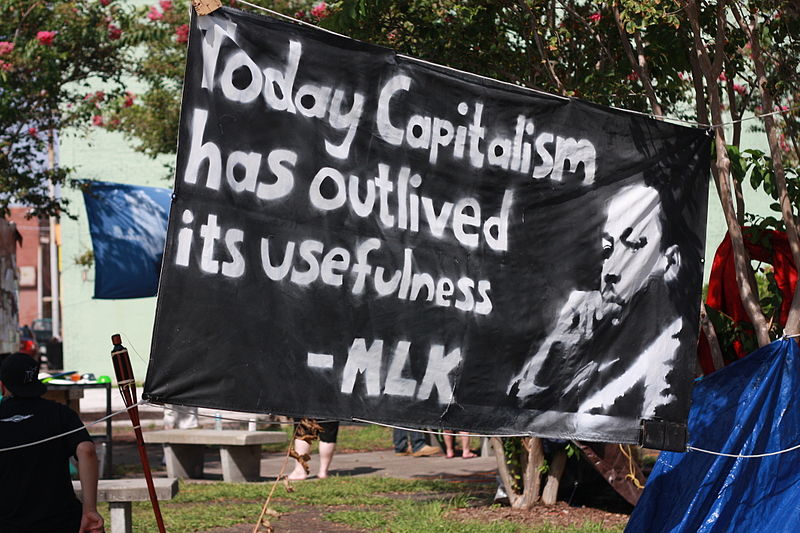
Martin Luther King banner at 2012 U.S. Republican Convention, courtesy commons.wikimedia.org
Nonviolent action provides the best hope for moving beyond capitalism to a more humane social and economic system. In the past, methods of nonviolent action such as strikes, boycotts, non-cooperation, sit-ins and alternative institutions have most commonly been used to challenge systems of direct violence, such as repressive governments. Capitalism is a more difficult system to challenge using nonviolent action because of the way it infiltrates people’s everyday thinking and behaviour. In order to develop a nonviolence strategy against capitalism, a careful analysis is required to pinpoint key areas for attention, spell out alternatives and highlight opportunities. At the core of capitalism is private ownership of the means of production, including land, factories and knowledge. This is backed up, ultimately, by the coercive power of the state. Problems with capitalism are well known, so only a summary is given here. Generally speaking, the system of ownership encourages individuals and groups to put special interests above general interests.
Read the rest of this article »
by M.K. Gandhi
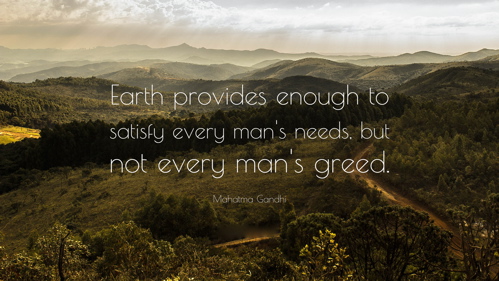
Poster art courtesy quotefancy.com
Editor’s Preface: This is the text of a speech, which Gandhi delivered in 1916. It is increasingly being cited as a key statement of his economic philosophy, most recently by Anthony J. Parel in his influential study, Gandhi’s Philosophy and the Quest for Harmony (Cambridge: Cambridge University Press, 2006, p. 81). It continues our series of making available important documents by Gandhi that we see increasingly cited in the literature. Please click on Gandhi’s byline above for easy access to our other postings, and please also see the Endnotes, and the note on the text, for acknowledgments and further information. JG
‘Does economic progress clash with real progress?’ When I accepted Mr. Kapildeva Malaviya’s invitation to speak to you upon the subject of this evening, I was painfully conscious of my limitations. (1) You are an economic society. You have chosen distinguished specialists for the subjects included in your syllabus for this year and the next. I seem to be the only speaker ill fitted for the task set before him.
Frankly and truly, I know very little of economics, as you naturally understand them. Only the other day, sitting at an evening meal, a civilian friend deluged me with a series of questions on my crankisms. As he proceeded in his cross-examination, I being a willing victim, he found no difficulty in discovering my gross ignorance of the matter. I appeared to him to be handling with a cocksureness worthy only of a man who knows not that he knows not. To his horror and even indignation, I suppose, he found that I had not even read books on economics by such well-known authorities as Mill, Marshall, Adam Smith and a host of such other authors. (1) In despair, he ended by advising me to read these works before experimenting in matters economic at the expense of the public. He little knew that I was a sinner past redemption. My experiments continue at the expense of trusting friends. For, there come to us moments in life when about some things we need no proof from without. A little voice within us tells us, ‘You are on the right track, move neither to your left nor right, but keep to the straight and narrow way.’ With such help we march forward slowly indeed, but surely and steadily. That is my position.
Read the rest of this article »
by Surur Hoda
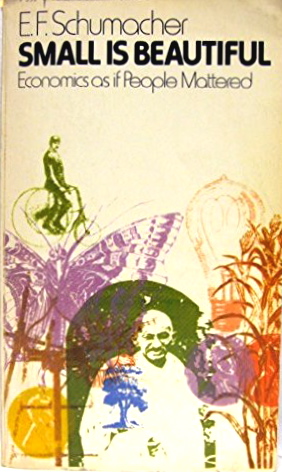
Dustwrapper art courtesy Harper Publishing; harpercollins.com
Gandhi’s visions of Gram Swaraj, self-sufficient but inter-linked village republics with decentralised small-scale economic structures and participatory democracy, left him immediately at odds with those in and outside the Indian National Congress who were seeking to develop India into a modern industrial nation state. To Gandhi, political freedom was merely the first step towards attainment of real independence, namely social, moral and economic freedom for seven hundred thousand villages. ‘If the villages perish India will perish,’ he had said. But the majority of academically trained, modern economists called his vision ‘retrograde’. Some extremists even described it as ‘reactionary’ or ‘counter-revolutionary’ and accused him of aiming to put the clock back.
Many of those who admired Gandhi’s skill in leading the struggle for national liberation reluctantly tolerated his economic views as the price to pay for his political leadership. They were sold on the concept of large-scale urban industrialisation and mass production. They failed to understand Gandhi’s economic insights and criticised him by saying ‘Whatever Gandhi’s merit as “Father of the Nation”, he simply does not understand economics.’
Yet almost a quarter of a century after Gandhi assassination, the German born economist E. F. Schumacher, when delivering the Gandhi Memorial Lecture at the Gandhian Institute of Studies at Varanasi (India) in 1973, described him as the greatest ‘People’s Economist.’ In his opening remarks, Schumacher told this story: ‘A famous German conductor was once asked who he considered the greatest of all composers. “Unquestionably Beethoven” was his answer. He was then asked, “Would you not even consider Mozart?” He said, “Forgive me. I thought you were referring to the others.”’ Drawing a parallel Schumacher said the same question might he put as to who was the greatest economist. ‘Unquestionably Keynes,’ he would reply, and be immediately asked, ‘Would you not even consider Gandhi?’ His answer would be, ‘Forgive me, I thought you were referring to the others.’
Read the rest of this article »
by Bhikhu Parekh
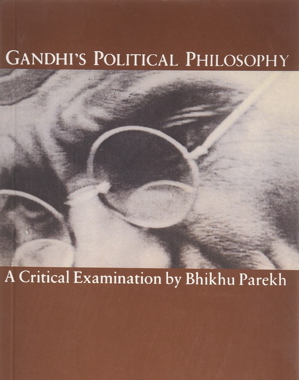
Dust jacket art courtesy Palgrave Macmillan; palgrave.com
Marxist interpretations of Gandhi contain important and valid insights that are, however, oversimplified; the picture is more complex and messy. The Congress under Gandhi’s leadership was not a party of the upper middle class. Although it did not reject the institution of private property, it assigned the State a considerable regulative and redistributive role, stressed the pursuit of social justice, and was not an advocate of unrestrained capitalism. To say, as some Marxists do, that since Congress did not advocate the abolition of the capitalist mode of production it was therefore a spokesman for capitalism, is to take too simple-minded a comment on the range of political possibilities open to radicals. Congress was essentially a middle class party, constantly reaching out to new groups and interests on both sides of the economic consensus in a way that was neither wholly capitalist nor fully socialist and not heavily biased towards a particular group. Rightwing and leftwing ideas grew up around its petit bourgeois core and both shaped and were in turn shaped by it. Nehru put the point well: “Even our more reactionary people are not so rigid in their reactions as they are probably in Europe and America. And even our most advanced people are somehow influenced by Gandhiji. He created connecting links between conflicting interests.”
The flow of political influence and the process of moral sensitisation between the different groups proceeded in both directions. The haute bourgeoisie influenced the Congress and enjoyed a measure of political power as the Marxists argue, but they were also required to recognise the legitimate demands of the poor and the oppressed. The middle and upper class peasantry did from time to time link up with the bourgeoisie, but it also retained its independence, threw up leaders of status and class loyalty, and influenced Congress policies on important matters. Many of these leaders were not created by or in any way indebted to the bourgeoisie, and had come to power on the basis of their personal sacrifices and leadership of peasant struggles. They had constituencies which they could not lightly ignore and whose interests they could not subordinate to those of some other class. The Marxist commentators exaggerate the situation when they claim that Gandhi delivered the peasantry to the capitalists.
Read the rest of this article »
by Prof. Giovanni Pioli
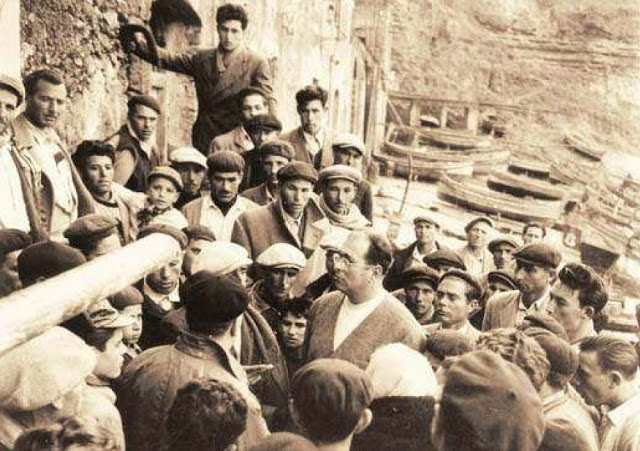
Dolci organzing the fishermen of Trappeto, 1952; courtesy en.wikipedia.org
Editor’s Preface: This article continues our series of historically important articles from the War Resisters’ International archive, our goal to trace the influence of Gandhian nonviolence on the early pacifist movements. This is from The War Resister, issue 71, Second Quarter 1956. We have previously published articles by or about Dolci, one of the great exponents of Gandhi’s constructive program. These may be accessed via our search box. Please consult the notes at the end for further information. JG
Pamphlets, bulletins and books have now been written by Danilo Dolci and the valiant men and women who join him for a time to share his experience, his poverty, his distress and his hard labour for the uplift of those submerged, demoralised ‘criminal’ masses who struggle — even beyond legal limits — for the bare necessities of life. Italian social workers, pacifists, and humanitarians respect this literature, dealing with conditions in Trappeto and Partinico, situated in the Province of Palermo, Sicily — infamous as a centre of Sicilian banditry and the mafia.
Read the rest of this article »
by Dr. Susan S. Bean
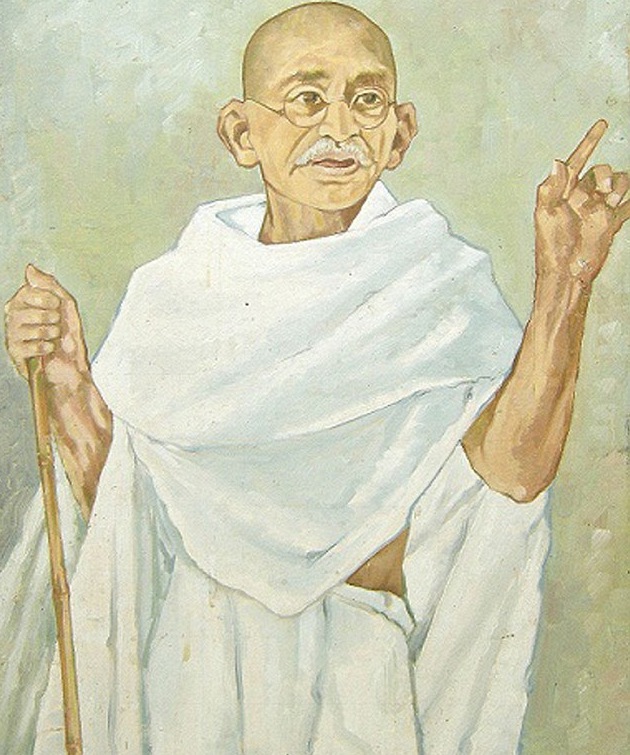
Painting of Gandhi, c. 1945, by J. L. Bhandari; courtesy dailymail.co.uk
Prologue: The story of khadi (homespun) and its creator Mohandas Gandhi is well known in India and around the world. In his political campaign for Indian self-determination (swaraj), Gandhi famously promoted the practices of making thread through spinning by hand, and wearing simple khadi garments – not only as key symbols of national identity, but also as a central statement of resistance to the colonial regime. As writer, producer and director, Gandhi instigated a national drama centred on the roles of spinner and khadi-wearer. Made from hand-spun yarn, his khadi would emerge from India’s handlooms not just to costume the nation but also to change the essential character of its people, altering colonial subjects into ‘citizens’. Seen as theatre, the narrative of khadi reveals how Gandhi transformed this cloth into much more than a mere textile, and how khadi exerted transformative and long lasting effects in India’s national movement. The drama of khadi illuminates the potency and tenacity inherent in this humble homespun cloth; already having proved itself within the framework of the freedom struggle, the story of khadi still resonates more than sixty years after India gained Independence. (1)
Read the rest of this article »
by Thakurdas Bang
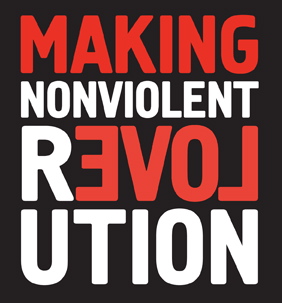
Peace News poster; courtesy peacenews.info
UNESCO’s famous opening sentence declares, “Since wars begin in the minds of men, it is in the minds of men that the defence of peace must be constructed.” What shall be the nature of such a society or community where the defence of peace is firmly laid? Surely such a community would be homogenous and interpersonal. As Gandhi said, “We can realise truth and nonviolence only in the simplicity of village life . . . Man should rest content with what are his real needs . . . Earth provides enough to satisfy every man’s need but not for every man’s greed. No one will be idle and no one will wallow in luxury. It will be a community in whose management all members freely and fearlessly participate. It must have a unity and a sense of purpose. Such a community will surely be based on social and economic equality.”
If we examine the condition of the recently liberated Asian and African nations and especially of India on the basis of these criteria, what do we find? Although political liberation has been secured, political power is still highly centralised and has not filtered down to towns and villages. The people still look to the government for everything. Everybody talks of rights, and few lay stress on duties. The blind copying of the Western democratic structure with its paraphernalia of political parties and decisions by majority has transformed every village and town into a warring camp. Villagers do not meet to discuss their problems and participative democracy is still a distant reality. Economic equality is a long way off and people are in acute poverty: large numbers of the unemployed live side by side with the rich steeped in their luxury. Chinese Communism is knocking at the door of India, yet the Indian rich evade taxation, and any legislation that might set limits on land. Nobody lays a stress on duty. Education in self-reliance and mutual cooperation is the crying need of the hour. How to bring about this psychological change leading to the corresponding institutional change?
Read the rest of this article »
by Charles Petrasch

Poster of Marx, Gandhi, and Hahnemann, the founder of homeopathy; courtesy arvindarora40.blogspot.nl
Editor’s Preface: Charles Petrasch was a French journalist working for the French newspaper Le Monde, and in the 1930s was their London correspondent. This interview was conducted in English on 29 October 1931, while Gandhi was in London to attend the Round Table Conference, being held by the British government to discuss constitutional reforms in India. Gandhi wanted self-rule or swaraj. To put pressure on the British government he had organized in India a boycott of British goods, especially cotton and cloth products from the northern English Lancashire mill towns. Gandhi’s sympathies were with labor, and while in England he visited the Lancashire mills to express solidarity, and was warmly received by the unions and workers. It was in this context that the interview took place. Petrasch wrote at the time: “My Indian friends and I had drawn up a list of questions which we wished to put to Gandhi before his departure from London, and we wrote down his replies as the interview went on.” Petrasch’s Indian friends were Marxists, and the interview appeared in Labour Monthly, a Marxist magazine founded and edited by Communist Party of Great Britain (CPGB) theoretician Rajani Palme Dutt (1896-1974). There was an ongoing dialogue between Gandhi and the Indian and European Marxists, some of it rancorous, as might be surmised by the asides in this interview. We have posted several other articles about Gandhi and Marxism, accessible through our search function. See the note at the end for further textual information regarding publications and dates. JG
Charles Petrasch: In your opinion, what is the method by which the Indian princes, landowners, industrialists and bankers acquire their wealth?
Mohandas K. Gandhi: At present by exploiting the masses.
Read the rest of this article »
by Jayaprakash Narayan
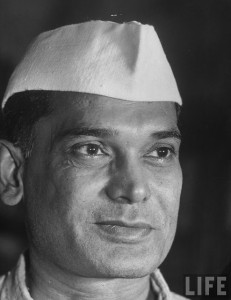
Narayan, c. 1947; Life magazine portrait by Margaret Bourke White; courtesy oldindianphotos.in
The Bhoodan movement aims not only at establishing world peace but also at creating the foundations of a peaceful life. Although everyone is interested in the problems of peace, very few stop to question what the sources of human conflict may be, and why it is that in human society there is strife of every kind including war.
Mahatma Gandhi was an exception in that he tried to go to the root of this problem, and he built up a philosophy of life based on what he called truth and nonviolence. In building up his philosophy he took help from wherever he could. It is well known how deeply indebted Gandhi was to Jesus, and how he always considered the Sermon on the Mount to be his greatest single inspiration. The philosophy of turning the other cheek was the foundation of his whole satyagraha movement, first developed in South Africa in 1906, and then in India. Among modern thinkers, he acknowledged Tolstoy, Ruskin and Thoreau to be his teachers. Whatever he tried to do, he did with an open mind; nothing was foreign to him just because it happened in a foreign country. He was what might be called a universal personality.
Gandhi applied his philosophy of satyagraha to the Indian freedom movement. I also was one of his humble soldiers and like so many Indians of those days I had to spend several years in prison. During those years, the freedom fighters had to go through all kinds of suffering, of which I think imprisonment was perhaps the least noxious. But travellers to India today are surprised to find that there is no ill will or bitterness anywhere for Britain or for the British people but, rather, a very warm welcome.
Read the rest of this article »
by Robert Ellsberg
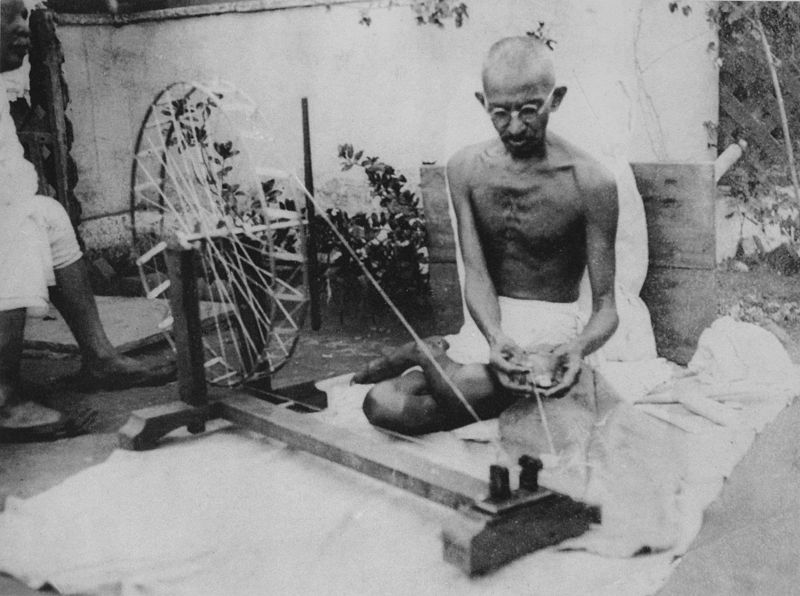
Gandhi spinning, c. 1945; photographer unknown; courtesy of wikipedia.org
“The outward freedom that we shall attain will only be in exact proportion to the inward freedom to which we have grown at a given moment. And if this is the correct view of freedom our chief energy must be concentrated upon achieving reform from within.” M. K. Gandhi
Thomas Merton observed that Gandhi’s spirit of nonviolence “sprang from an inner realization of spiritual unity in himself. The whole Gandhian concept of nonviolent action and satyagraha is incomprehensible if it is thought to be a means of achieving unity rather than as the fruit of inner unity already achieved.” Satyagraha in its sense of truth-force, or soul-force as Martin Luther King called it, could not be a means for overcoming division, unless it represented in itself the active experience of the unity of life; it could not secure a peace from without that was anything but the gift of its own being, a love rooted beneath the surface of things. For the satyagrahi each battle must first be fought in the soul—the battle against selfishness, attachment, passion. One could hardly begin the outer struggle—to wean the opponent from his or her selfishness, attachment, and passion, until the inner battle had been fought, and Truth had been victorious. The task was merely to re-enact that struggle on a larger stage. Truth never engaged in a struggle that had not already been won.
Read the rest of this article »














